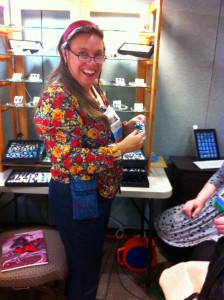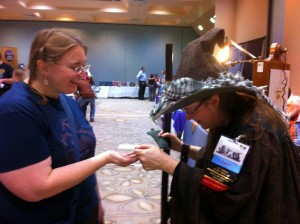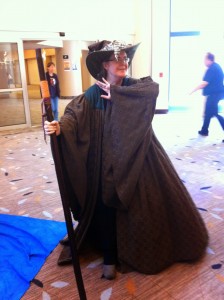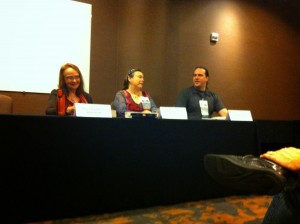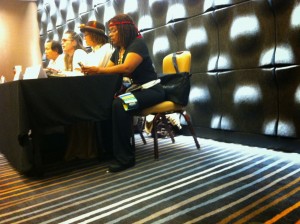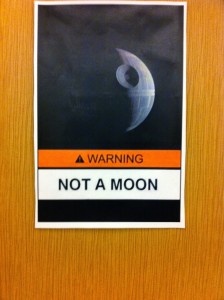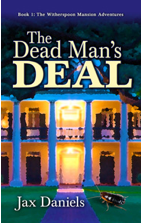I had the fortune of “meeting” Jo through Tickety Boo Press (TBP). I felt an affinity for her immediately since we are about the same age and have been writing genre fiction since we were children. I’ve heard good things through the grapevine about her first novel with TBP. Jo and I are cross-pollinating our Web sites this month, so stop by her site and read That’s What Editors Are For.

Abendau’s Child is available for preorder on Tickety Boo Press.
I’m just starting to get asked interesting questions about being a writer. I’ve had the “Oh, I hope you aren’t intending to put me in your novel” (nope, and even if I did by page three you’d have changed sex, creed, colour, and become an alien life-form, given my thinking processes), the “That sounds exciting” (it’s really not), and the dreaded “Where do you get your ideas?”
That one’s a pig to answer. Partly because I write quite diverse things: I’ve had people with removable souls in their arms; tricksy AIs; aliens invading Belfast; a sexy love affair on Callisto (not seen the light of day, that one); a huge space opera world. Somehow, they’ve all resided in my head and popped out. I worry I have a great pit at the back of my mind where I should have some useful knowledge. Like algebra.
However, since I hope to write lots, lots more (just need to work out the ‘time/income-eating’ thing), I thought it was about time I answered that question and figured out what sort of themes drive me. It seems like what a Proper Writer should do.
My first world came into being in the mid-eighties when I was sixteen. It’s changed a lot since then but, in essence, it is that world. Some of the big sci-fi influences on it are clear: Blake’s 7 was my favourite show in the seventies (but I loved the quirky, twisted character of course, so Avon got a nod in the main character’s name), and a certain amount of Servalan’s style transferred to my Empress, although my so-and-so’s much nastier.
So, too, are the Star Wars elements—psi powers are important in my trilogy (although they lack the mysticism of the Force and are Properly Scientific), and the level of technology in Abendau is properly equatable to Star Wars, although I have no droids or aliens.
Dune had a later influence when I was shaping my central planet, and it turned out to be a desert world—one without giant worms and spice, albeit, and with its own history and culture, but I’d still give a sage nod if anyone wants to mention Dune as an influence (and there could be much worse influences).
But it isn’t just this mish-mash of story influences that became uniquely Abendau, my sense of place and my background are central to the things that inspire me. Working in a medieval castle near Belfast had its own inspiration—my torture chambers are housed in an ancient part of a futuristic palace, for instance.
What’s harder to work out is where the themes that I now recognise after writing several books come from. Themes around edge of madness come up a lot—people struggling on that edge, hiding it under normal lives; people where madness is an ill-defined but deep-seated part of who they are. I have no deep hidden secrets in that arena, no reason to explore it. Perhaps it is simply that the conflict it creates in a character is so central, close to their core, that I find it fascinating.
Perhaps some of my inspiration is rooted in the needs of a sixteen year old girl. Kare is a protector, a complex person with a core that is untouchable. A person with more demons than would fit in the average crypt. When I found out about existentialism as a concept, it rooted in him. Kare became a person who followed his own path, living by his own morals, having been left to find them for himself. He makes decisions based on personal beliefs, rather than something religious or spiritual. Thus I found inspiration in a philosophy, perhaps, or just one of those alchemical moments of writing where the missing conundrum reveals itself. That’s how elusive inspiration is; a narrow coil of visuals, beliefs, knowledge, memories, and ideals needing to be unwound and dissected. I’m not sure I’m able to do that for myself—I’m not sure anyone is.
Which is where I was when it occurred to me around a year or two ago that I’d have to keep getting new ideas. That worried me. I sat with a notebook with the words “What if…?” written in bold and tried to come up with scenarios. I think I managed one. The wall of panic was considerable—I wanted to write, I was getting better at it, but the ideas well was empty.
Since then, I’ve realised a blank piece of paper and some forced words are not where I gain inspiration. I find flash fiction useful, especially when inspired by something visual. Three of my novels have come from a 75- or 300-word piece.
“What if?” may not work for me on the harsh white page, but ask it out in the magic of some primal forest or by the roar of the sea and results are a lot different. Last summer, on my holidays—no writing, or thinking about writing, of course—I looked around the woodland up into some trees and knew there was a story waiting in that forest. That new little baby book is about 20,000 words now, and whatever is in those woods wants into my character’s head. And now we’re at that edge between the normal and unbalanced again.
I’m not sure any of this helps another writer. Inspiration is so hard to explain, that moment of magic where you realise you have a story. I think it’s an individual thing that comes with time, when you realise what sparks your imagination. Inspiration needs a chance to catch and burn, a way of getting out; that is something that can be managed. You can make time for the your story, for the growth of the spark. Don’t be ashamed to revel in what if?—that defines science fiction. Staring into space?—that’s part of the writing process just as much as typing and editing and promoting is. Even on holiday…
CONTEST! Leave a comment and email in the month of January and be eligible to win a Kindle version of The Dead Man’s Deal by Jax Daniels. Emails will be used only for contacting the winner.

